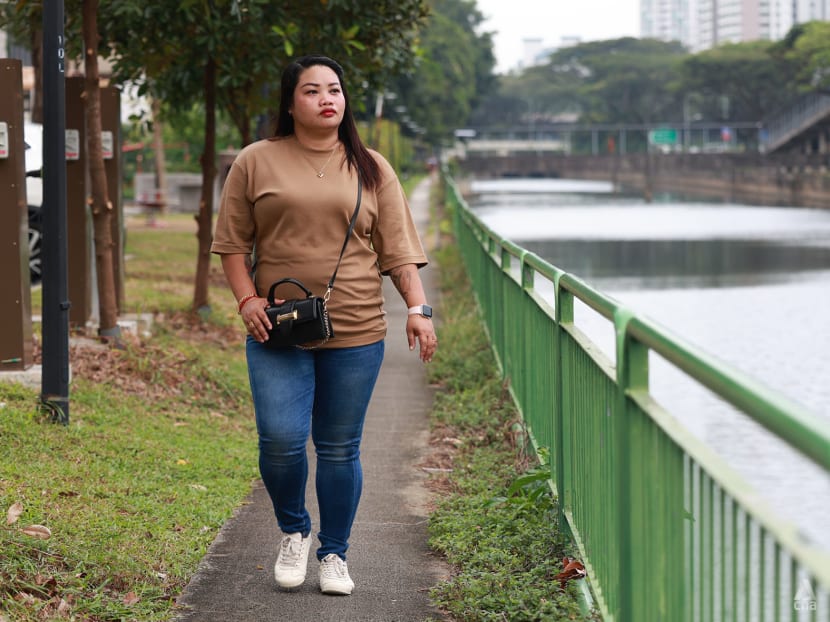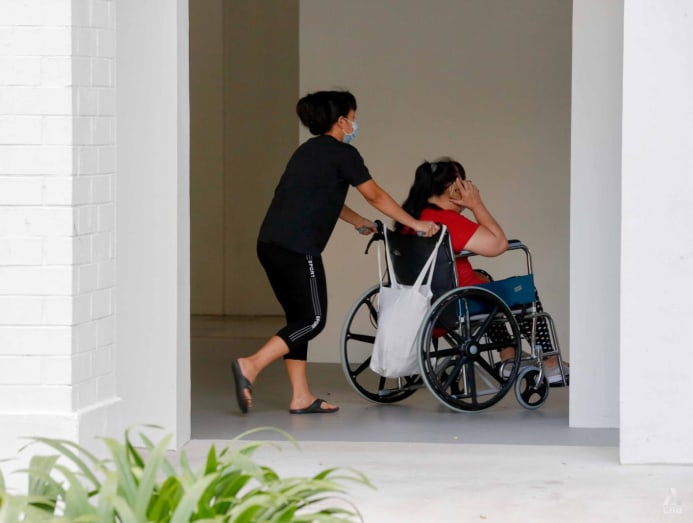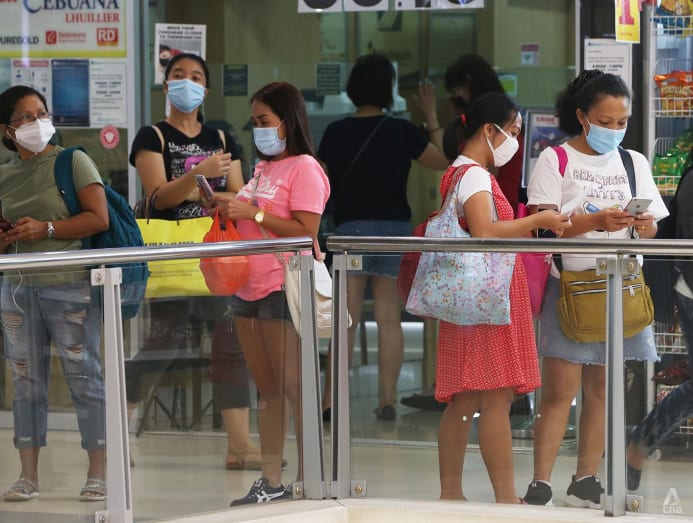'Like a death sentence': Some migrant workers, maids with inadequate medical coverage hide conditions for fear of being sent home
The recent death of Bangladeshi worker Fazley Elahi who had colon cancer has raised questions on whether better insurance coverage is needed to support migrant workers in their darkest hour.

Domestic worker Eleanor Albarece (pictured) from the Philippines, 40, developed multiple fibroids in her pelvis and had a hysterectomy back in her home country. (Photo: CNA/Raj Nadarajan)

This audio is generated by an AI tool.
When foreign domestic worker Jhona Muestas, 40, discovered a lump in her left breast in 2019, she did not tell a soul because she was afraid she would be told to go back home to the Philippines.
“I am the breadwinner of the family and have four children," she said. "Two of them are in college, so I need to support them. I was scared to lose my job.”
The secret was kept for five years until May last year when she was admitted to the National University Hospital after having a persistent fever. The doctors diagnosed her with stage four breast cancer.
Her employer, for whom she had worked for seven years, used up the maximum sum of Ms Muestas' S$15,000 annual insurance claim limit after two weeks in hospital, where she did many scans and tests.
However, with the cancer spreading to her spine, Ms Muestas needed more money immediately to undergo surgery.
The church friends and school community of her employer donated money and they raised more than S$69,000 to pay for her surgery in Singapore. This amount covered most of the cost.
Her employer has continued to support her living expenses since August last year when she headed home to undergo further treatment.
Ms Muestas' account of facing huge bills after being stricken by a medical condition is not uncommon among domestic workers and migrant workers here. Some of them just do not have adequate insurance coverage.
The support that Ms Muestas received from her employer is rare, non-profit organisations said, adding that many employers would choose to immediately send their workers home even if there is a possibility of raising money for their treatment or looking to insurance claims.
Ms Debbie Fordyce, president of non-profit Transient Workers Count Too (TWC2), said that they have had 60 migrant workers approaching the organisation to help with medical expenses in the last two years.
The medical conditions they faced included kidney stones, carcinomas (cancerous growths), a paralytic stroke, thyroid problems and acute stomach pain.
TWC2 seeks to improve conditions for low-wage migrant workers and Ms Fordyce said: “For almost all the workers who come to us, we have to advise them that if the employer is not willing to pay, no one will. And there’s no way that they’re going to get the treatment they need.”
Another migrant worker Fazley Elahi, known for founding a cultural show and library for fellow migrant workers, recently died on Feb 4 after he was diagnosed with colon cancer in 2022.
The 38-year-old relied on crowdfunding campaigns to pay for his medical fees, which stretched to tens and thousands of dollars.
Mr Fazley’s death put a spotlight on how well-insured migrant workers and domestic workers are, raising the question of whether more needs to be done to ensure that their insurance payouts are enough to tide them through a non-workplace-related medical emergency and if employers can be made to take more responsibility.
For domestic worker Bhing Navato, getting diagnosed with cervical cancer in June 2023 was “like a death sentence”.
Ms Navato had just a month’s salary left in her pocket and her employer cancelled her work permit after learning about her condition.
A fundraiser pooled S$16,000 for her chemotherapy treatments in the Philippines, which was “a lifeline” for her and her family.

LOW-WAGE WORKERS CHARGED AS MUCH AS MEDICAL TOURISTS
Before July 1, 2023, employers hiring migrant workers were required by the Ministry of Manpower (MOM) to provide medical insurance coverage for non-workplace-related injuries with an annual claim limit of at least S$15,000.
This has since been increased to S$60,000, with employers paying 25 per cent and insurers paying 75 per cent for claim amounts above S$15,000. Employers may choose better insurance coverage, albeit for higher premiums, at their own expense.
However, insurance policies with a start date before July 1, 2023 still have the S$15,000 limit.
But by the next policy renewal, the higher coverage of S$60,000 must apply. So by July 2025, all work permit holders should be on the enhanced medical insurance.
For migrant workers living in dormitories and work in the construction, marine shipyard or process sectors, it is also compulsory for their employers to get them on the Primary Care Plan.
Eligible workers pay S$5 for each visit to the clinic but these cover just acute or chronic conditions such as flu-like illnesses or hyptertension.
The Primary Care Plan does not cover complicated conditions requiring specialised or tertiary care such as cancer, chronic heart failure or inflammatory bowel disease. These cases have to be referred to hospitals, Dr Ho Chin Swee said. He is lead for SATA CommHealth, which has five clinics serving migrant workers.
When contacted, MOM said that the minimum mandatory insurance coverage with co-payment was "sufficient to cover about 99 per cent of all hospital bills for migrant workers and migrant domestic workers, while maintaining the affordability of insurance premiums for employers".
Giving her view, social entrepreneur Anthea Ong, a former nominated member of parliament, said that even the improved mandatory insurance requirement has limitations.
The amount is not enough to cover critical illnesses such as late-stage cancer, which can cost upwards of S$100,000 in Singapore, she added.
It also does not cover outpatient treatment such as chemotherapy, or overseas care if the worker is sent back home.
“Our migrant workers, who sometimes earn just $800 a month, are charged the same fees at the public hospitals as a foreign chief executive officer. These expenses are beyond their reach,” Ms Ong said.
Ms Fordyce from TWC2 said as well that it does not make sense for low-wage workers to have to pay the same fees as wealthy medical tourists.
Ms Ong cited the example of the late migrant worker Fazley who had colon cancer, whose bill at Singapore General Hospital came up to S$84,000.
“Even if he had the S$60,000 coverage, which he didn’t, there would still be a S$24,000 shortfall, which is a substantial amount even for an ordinary Singaporean.”
Bangladeshi Nazmul Hossain, 29, who worked in Singapore for seven years painting housing blocks, was diagnosed with stage four gastric cancer in June last year. His employer decided to repatriate him after hearing the news.
Migrant rights organisation Migrant Mutual Aid supplied him with S$3,005 for his surgery back in Bangladesh to reduce the size of his cancerous tumours.
Mr Nazmul had to pay for his own palliative chemotherapy sessions with help from his co-workers back in Singapore. Each treatment session costs S$800.
He told CNA TODAY from Bangladesh: "I didn't want to come home from Singapore like this. I wanted to come home happily. But returning after seven years, I was not happy, my family was not happy, everyone was not happy. I did not want to take any problems home."
MANY EMPLOYERS CHOOSE TO SEND WORKERS HOME
A maid agency told CNA TODAY that it has had employers wanting to get their helpers home the moment the workers fall ill, rather than find ways to cover their medical expenses.
Mr David Bensadon, managing director of We Are Caring, a recruitment agency for domestic workers, referred to a case where a cancer-stricken maid was scheduled for an operation on a Wednesday.
The employer lied to the woman that the insurance would not cover the operation, even though she was fully insured. The domestic worker, who was from the Philippines, followed her employer’s orders to return home and boarded the plane back on Monday night.
Mr Bensadon called the worker on Tuesday morning, only to realise that she had already left Singapore.
“The employer was the vice-president of a leading European bank. When I think about it, this was probably the family with the least excuse to send the helper back,” Mr Bensadon said.
He also pointed out that most employees do not opt for higher insurance coverage for their domestic workers even though the difference in premiums may be nominal. About half of the employers would choose the bare minimum required and around 12 per cent would go for S$100,000 in coverage.

Ms Jaya Kumar said that there is a fundamental power imbalance between employers and employees.
She is the senior manager for advocacy and research at non-profit Humanitarian Organisation for Migration Economics, which supports migrant workers and advocates for their rights.
She added: "Employers may repatriate workers who have serious illnesses out of fear that medical costs may exceed what is covered by insurance, or that the worker may need treatment that is not covered by insurance in the first place."
Ms Ong the social entrepreneur said that the power imbalance also extends to whether workers can get access to treatment without permission from their employers in a healthcare setting.
“But the employer shouldn’t decide, right? In Singapore, we generally just forget that employers don’t own migrant workers, especially when it comes to whether the workers should live or not when they have a critical condition.”
She hopes that there can be greater awareness and education on the different types of compensation available to workers, because such details can be confusing for migrant workers with even some employers unclear about the nuances.
Domestic worker Eleanor Albarece, 40, faced the problem of being unable to access her insurance policy early last year because her employer was imprisoned. She had experienced continuous bleeding for two months after a delay in her menstruation for two months.
Although her employer's relatives paid for any expenses incurred in Singapore, she ultimately had to return to the Philippines to get a hysterectomy and remove multiple fibroids that were the source of her bleeding. The money for the procedure came partly from Migrant Mutual Aid with the rest coming from her siblings.
"Nobody could help me to process the insurance. My friend told me that I had to get an appointment, but I didn't know the insurance policy number, so I couldn't get back the money we spent (in Singapore)," Ms Albarece said.

HAVE PERSONAL INSURANCE PLANS, BRING BACK SUBSIDIES
Last December, driven by her experience raising money for cancer-stricken Fazley from Bangladeshi, Ms Ong co-founded the CritiCare Fund, a community-led initiative to offer relief to foreign workers for life-saving treatment.
The fund does not only help with hospital bills, but also offers replacement income for the affected workers and their families.
CritiCare, she said, is a stop-gap measure and there is still a need to look into wider policy changes.
She hopes that the fund will serve as a platform to collect data about how many migrant workers here fall critically ill, what their illnesses are and how much they have to pay in hospital bills.
In the long term, this data will help Ms Ong to “champion and advocate for changes in policy or substantiate the necessary support from insurance companies”.
Dr Sudesna Roy Chowdhury, a facilitator at Migrant Mutual Aid, suggested that the government bring back subsidies for migrant workers who are hospitalised for serious illnesses at public hospitals. These subsidies ceased in October 2007, putting the responsibility on employers to care for these workers.
Speaking about Migrant Mutual Aid's own fund that has supported 67 foreign workers since 2020, she said: “Migrant Mutual Aid was born out of necessity. It is a direct result of systemic issues that have put migrant workers in this vulnerable position, such as the persistently low wages that have not been pegged to inflation the way Singaporeans' salaries are, the power imbalance between them and their employers, or the healthcare limitations that they have in our system.”
Mr Bensadon from We Are Caring also proposed that there could be options for foreign workers to buy affordable insurance plans on their own, “a monthly S$10 or S$20 amount to cover a long-term condition”.
“Some might think that if you’re a person, then you should have a level of responsibility and agency over your finances. At the moment, everything goes through the employer, and the employer has competing priorities such as caring for their own family members.
“So maybe there is space for an innovative approach where the worker herself would have a role in her own insurance policy, having an added level of coverage that is not dependent on what the employer chooses for her,” Mr Bensadon said.
Ms Ong emphasised that foreign workers have contributed much to the growth of Singapore, serving the economy and being caregivers to families.
“So when they are in their darkest hour, we should show up and be there for them.
"Donate regularly if you can – these are not just their livelihoods at stake, these are their lives at stake.”












